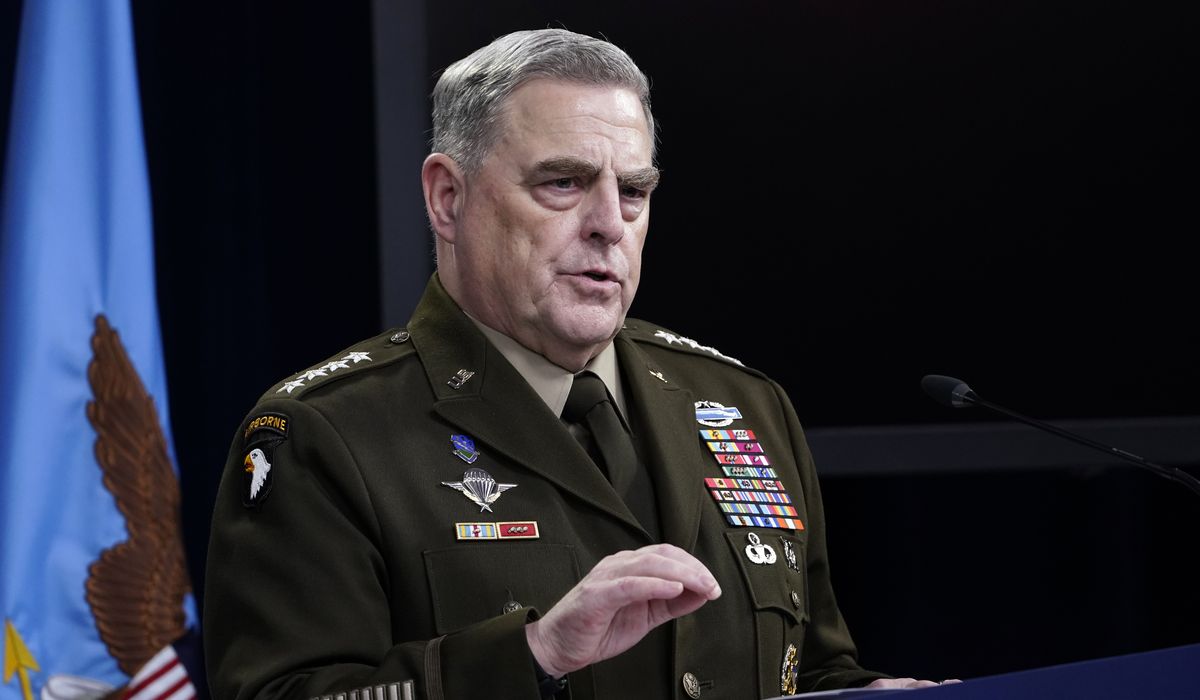
The Pentagon doesn’t know how many extremists are in the armed forces and has yet to compile reliable data on the subject, the military’s top commander said Thursday as he warned that extreme ideologies threaten to “infect our organizations and tear them apart.”
Joint Chiefs of Staff Chairman Gen. Mark Milley told a House appropriations hearing Thursday that he is confident the number of service members who hold hateful or extreme beliefs is quite small, though it’s impossible to know exactly what the number is. Gen. Milley’s comments come amid a major military-wide crackdown on extremism that critics say is inadvertently sweeping up conservatives whose religious or political beliefs may be viewed as “extreme” by some on the left.
Military officials have vehemently denied that accusation and say they’re focused solely on those who participate in potentially violent groups such as extremist militias or white supremacist organizations, and especially those who may be willing to take part in anti-government attacks such as the Jan. 6 storming of the U.S. Capitol.
But months into the military’s effort, there’s still no clear indication of how many individuals might hold such beliefs.
“The numbers are small. We’re confident of that. We don’t actually know because we don’t have good data,” Gen. Milley told the House Appropriations subcommittee on defense. “But let’s just say it’s one-tenth of 1%. That’s 2,000 people. What if we had 2,000 terrorists, ISIS terrorists, al Qaeda terrorists, or Nazis, or facists, or Ku Klux Klan, in our ranks. That could be extremely divisive.”
“There’s no room for that in the United States military,” he said.
Gen. Milley said that such ideologies undermine the cohesion that makes the U.S. military the best in the world.
“It has to do with combat power and cohesion of our organizations, and the divisiveness that can infect our organizations and tear them apart,” he said.
Gen. Milley’s comments come amid growing concern on Capitol Hill and across Washington about exactly what the military will classify as extreme. Key Republican lawmakers, for example, have publicly questioned the recent removal of Space Force Lt. Col. Matthew Lohmeier, who lost his command after publicly questioning “neo-Marxist-based” race and diversity programs in the military in a self-published book that is now a best-seller.
His abrupt dismissal for airing his views on a podcast earlier this month is now being investigated by the Air Force inspector general.
“My Republican colleagues and I hear regularly from active-duty and retired service members that even holding conservative values is now enough to endanger a service member’s military career,” Alabama Rep. Mike Rogers, the ranking Republican on the House Armed Services Committee, said last week.
Col. Lohmeier was dismissed weeks after a military-wide “stand-down” on extremism ordered by Defense Secretary Lloyd Austin. The 60-day initiative ran from early February through early April and required commanders at all levels of the military to set aside one day to discuss hateful ideologies, bigotry, discrimination and related issues.
Mr. Austin and other military officials insist that the initiative has not targeted those with politically conservative beliefs and never will in the future.
He told lawmakers that the military must do a better job screening recruits to keep out anyone with extremist leanings.
“A small number of people can have an outsized impact on a great organization,” Mr. Austin told the House subcommittee Thursday. “We have increased our efforts to, No. 1, as people apply to come into the military, do a better job of screening people and make sure we’re bringing in the right kinds of people who don’t bring additional baggage with them.”
• Mike Glenn contributed to this report.
